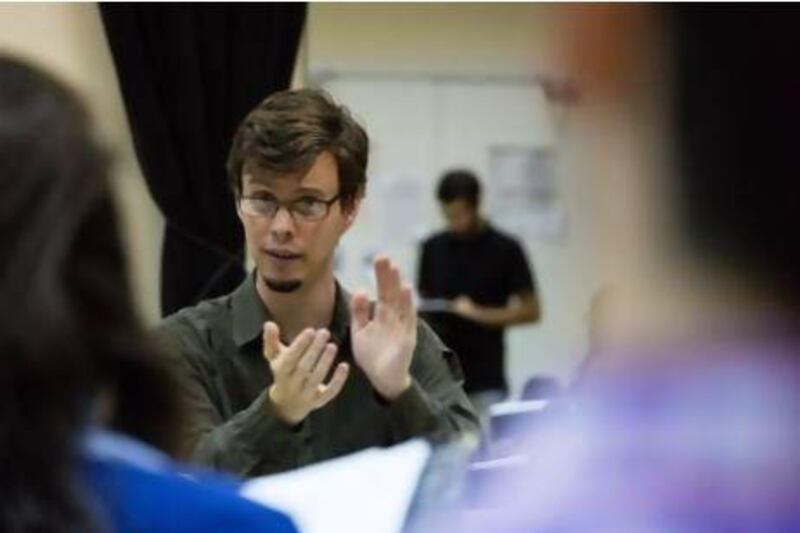Most of them have similar stories. Of the 20 young people who make up the Nassim Al Saba choir, only one or two harboured ambitions to sing from an early age. The others were either looking for a break from their academic routine, or for camaraderie and a bit of fun.
But, accidental or not, the choir that has formed slowly over the past three years is beginning to shine, with its members singing in a metre and style that is unusual – making them a choral talking point on the international circuit.
Nassim Al Saba, from the Performing Arts Programme, College of Arts and Sciences, the American University of Sharjah, is the first choir in the Gulf to sing Arabic songs in four parts - bass, tenor, alto and soprano. With five bass singers, four tenors, six altos and five sopranos, they are only one of a handful in the world to perform in this way.
By definition, traditional Arabic music is monophonic - it holds only one melodic line - but practitioners, singers and musicians alike have made it heterophonic by embellishing and singing or playing around the note, giving it the beauty and sound that is distinctive to the Eastern tradition.
Professor John Perkins, Nassim Al Saba's artistic director and conductor, says the choir has removed those fluctuations and divided it into four parts. "We have taken the Western choral genre and applied it to Arabic music," he says. "I did question whether this would be making traditional music unauthentic, but what it does for our students is that it gets them hooked on to their heritage in an active way. They know the music, they have grown up singing it a little bit but they have never gone out on stage and performed. Now they have that chance."
Marwah Al Bakri, 22, is a Jordanian alto singer. "When I first came into the choral ensemble I never thought I could sing but Professor John encouraged me and now I am going to be on stage in New York, singing to large audiences," she says. "It has given me the confidence to believe that you can do anything you put your mind to."
Her choir mate Rindala Khallouf, 22, from Syria, who sings soprano, says that when she joined the choir, it was the first time she had sung in front of another human being.
"It is very supportive being in a group like this and I have made great friends. But the choir and music are very interesting to me and the programme is very exciting - we are going to places and singing different repertoires and it is now a big part of my life."
Singing songs such as Fog El Nakhal, a traditional Iraqi/Syrian melody and El Helwa Di, which is popular across the whole region, the choir is reigniting traditions and making the music more accessible to Western audiences as well as younger Arab audiences whose culture may be diluted by globalisation.
"Choral music has become a museum or a preservation device for the world," explains Perkins. "Arab culture is mixing so much with other cultures that we see Arabic four-part music as holding up its authentic values."
Since 2010, the choir has been performing in and around the UAE on a regular basis. From workshops at the UAE University in Al Ain to a performance at a United Nations dinner in Abu Dhabi, they performs six or seven times a year.
The first international recital was in 2011 in Bandung, Indonesia, and they have also travelled to Jordan. In April, the group will embark on a week-long tour of New York, performing four concerts including one at Carnegie Hall, where they will sing Gabriel Faure's Requiem alongside Lebanese and American choirs. During this time, they will also perform at the NYU Steinhardt School of Music and at an intercultural concert at the First Unitarian Church in Brooklyn Heights.
It is an exciting, dynamic programme for the young choir members, who are clearly proud to be taking their traditions to the other side of the world.
Perkins says they all work as a team and each person contributes equally to the overall sound. "One of the wonderful things about choirs is that you can make a professional sound with a large group of non-professionals."
Follow their progress on www.facebook.com/NassimAlSabaAUS
Follow us
[ @LifeNationalUAE ]





